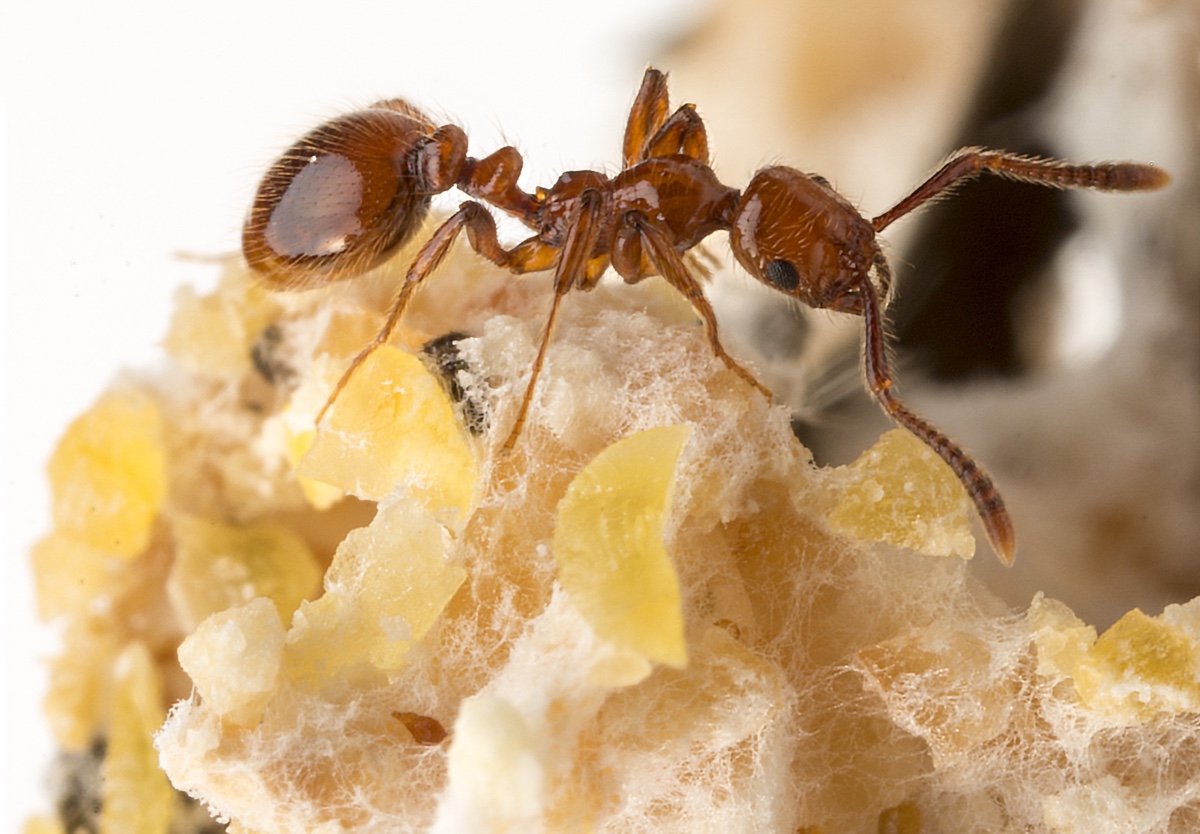Baby-Eating Ants Use Espionage, Chemical Warfare To Score Free Rent

The ants known as Sericomyrmex amabilis are humble farming folk. They tend thriving fungus gardens across Central America; raise big, hard-working families; and are always happy to let a neighbor drop in for a bite to eat — even when those neighbors are freeloading parasites and the "bite" includes a few of the farmers' babies.
Biologists estimate that about 75 percent of all S. amabilis nests also host a greedy parasite ant called Megalomyrmex symmetochus. These so-called social parasites show up to already-thriving fungus farms and can stay there for years, gorging on the farmer ants' crops — and sometimes their protein-packed larvae — without contributing a lick of work to the enterprise. And yet, through all of this, the farmer ants rarely raise a feeler to kick the buggy thugs out. Why not? [Photos: Ancient Ants & Termites Locked in Amber]
The reason for this awkward cohabitation, according to a new paper in the May 2018 issue of the journal Animal Behaviour, appears to be insect espionage with a dash of chemical warfare. Despite their freeloading, baby-eating manners, M. symmetochus ants have something their hosts don't: a potent venom that's been shown to scare off even more-aggressive invaders.
"It's likely a scenario where the enemy of your enemy is your friend," study author Rachelle Adams,an ant evolution specialist and assistant professor at The Ohio State University, said in a statement. Indeed, past studies have captured footage of M. symmetochus ants rushing to defend their hosts' fungus gardens from other invading species.
In their new study, Adams and her colleagues built two lab-controlled S. amabilis nests: one that had been exposed to parasites, and one that hadn't. The researchers then watched what happened when new M. symmetochus parasites were introduced to the mix.
At first, the farmer ants seemed resistant to welcoming unfamiliar parasites to the nest. However, something caused the hosts to quickly change their tune. "When confronted with a parasitic ant, the farmer ant will at first lunge at the intruder, but then instead of biting, she'll pull away and bow her head down in a submissive response," Adams said.
Chemical analysis of both ant species revealed that the parasites had a distinctly different smell than the famers; this included traces of a potent alkaloid venom used to fight off even deadlier foes. The farmer ants can likely sense this venom from afar, the researchers wrote, and may have evolved to accept the parasites into their nests as a sort of mercenary defense force.
Sign up for the Live Science daily newsletter now
Get the world’s most fascinating discoveries delivered straight to your inbox.
"Both the chemical profiles of parasites and the behavioral data support the hypothesis that the parasites use weaponry to maintain an amiable association with their host ants," the researchers wrote. In return for some occasional military support, parasites get a free place to crash, free meals and a sort of diplomatic ant immunity.
Once accepted into a host's nest, the parasites seem to tune down their venomous aroma and tread more stealthily. The researchers hypothesized that this might be the result of a common parasite tactic called "insignificance," in which the parasite emits a benign odor that literally smells like nothing to the host. Cloaked in the smell of nothingness, the parasite can essentially walk invisibly among the host's ranks. In summary, you could say that M. symmetochus ants tread softly and carry a big, venomous stick.
Still, this lopsided roommate arrangement doesn't always last forever, the researchers noted. In the lab and in the field, some host colonies have been observed rebelling against their parasite nest-mates after living together for more than seven years, either destroying the parasites entirely or severely culling their ranks. Further study into this seven-year insect itch is still required.
Originally published on Live Science.

Brandon is the space/physics editor at Live Science. His writing has appeared in The Washington Post, Reader's Digest, CBS.com, the Richard Dawkins Foundation website and other outlets. He holds a bachelor's degree in creative writing from the University of Arizona, with minors in journalism and media arts. He enjoys writing most about space, geoscience and the mysteries of the universe.









